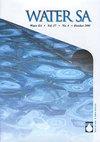Cyclopia subternata growth, yield, proline and relative water content in response to water deficit stress
IF 1.2
4区 环境科学与生态学
Q4 WATER RESOURCES
引用次数: 0
Abstract
Cyclopia, generally known as honeybush, and belonging to the Fabaceae family, originates from the Cape Floristic Region of the Eastern Cape and Western Cape provinces of South Africa. Currently, 6 honeybush species are commercially cultivated but, to date, there have been limited trials attempting to study their agronomic water demand. A pot trial was conducted where Cyclopia subternata plants were cultivated on different soil types (Stellenbosch granite, Stellenbosch shale and Stellenbosch clovelly) and subjected to three different water-deficit stress levels (well-watered, semi-stressed and stressed). Remarkably, irrigation treatments and soil types did not significantly affect the growth of the plants. However, the well-watered treatment consistently had higher yields compared to the other two treatments. The water-stressed (semi-stressed and stressed) treatments had lower relative water contents (RWC) with higher concentrations of proline, which signify water stress, compared to the control treatment. Higher proline and lower RWC contents found in this study are indications of water stress.水亏缺胁迫对沙棘生长、产量、脯氨酸和相对含水量的响应
独角蜂,俗称蜜丛,属于豆科,原产于南非东开普省和西开普省的开普区。目前,有6种蜜丛被商业化栽培,但迄今为止,研究其农业用水需求的试验有限。采用盆栽试验的方法,在不同土壤类型(花岗岩、页岩和四叶草)上栽培Cyclopia subternata植株,并对其进行3种不同的水分亏缺胁迫水平(丰水、半干旱和干旱)。灌溉处理和土壤类型对植株生长无显著影响。然而,与其他两种处理相比,水分充足的处理始终具有更高的产量。与对照处理相比,水分胁迫(半胁迫和胁迫)处理的相对含水量(RWC)较低,脯氨酸浓度较高,表明水分胁迫。较高的脯氨酸和较低的RWC含量是水分胁迫的标志。
本文章由计算机程序翻译,如有差异,请以英文原文为准。
求助全文
约1分钟内获得全文
求助全文
来源期刊

Water SA
环境科学-水资源
CiteScore
2.80
自引率
6.70%
发文量
46
审稿时长
18-36 weeks
期刊介绍:
WaterSA publishes refereed, original work in all branches of water science, technology and engineering. This includes water resources development; the hydrological cycle; surface hydrology; geohydrology and hydrometeorology; limnology; salinisation; treatment and management of municipal and industrial water and wastewater; treatment and disposal of sewage sludge; environmental pollution control; water quality and treatment; aquaculture in terms of its impact on the water resource; agricultural water science; etc.
Water SA is the WRC’s accredited scientific journal which contains original research articles and review articles on all aspects of water science, technology, engineering and policy. Water SA has been in publication since 1975 and includes articles from both local and international authors. The journal is issued quarterly (4 editions per year).
 求助内容:
求助内容: 应助结果提醒方式:
应助结果提醒方式:


